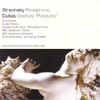Stravinsky Orchestral Works
A Prom performance fully alive to the drama of Stravinsky’s wonderful score
View record and artist detailsRecord and Artist Details
Composer or Director: Igor Stravinsky, Paul (Abraham) Dukas
Genre:
Opera
Label: Warner Classics
Magazine Review Date: 13/2004
Media Format: CD or Download
Media Runtime: 67
Mastering:
Stereo
DDD
Catalogue Number: 2564 61548-2

Tracks:
| Composition | Artist Credit |
|---|---|
| Perséphone |
Igor Stravinsky, Composer
Andrew Davis, Conductor BBC Symphony Chorus BBC Symphony Orchestra Cantate Youth Choir Igor Stravinsky, Composer Nicole Tibbels, Soprano Paul Groves, Tenor Trinity Boys' Choir |
| Polyeucte |
Paul (Abraham) Dukas, Composer
BBC Symphony Orchestra Paul (Abraham) Dukas, Composer Yan Pascal Tortelier, Conductor |
Author: rnichols
Stravinsky’s recordings of his own music always have a certain something that one can’t do without. But, that said, it’s surprising what performers under his baton were allowed to get away with: Madeleine Milhaud, for instance, who recited the role of Perséphone, could never persuade him to take his nose out of the score and give her the occasional cue. In his recording of the work, it’s the French language that suffers. Not only at his own hands (as David Nice tells us in his thoughtful and well-researched booklet-note, André Gide stayed away from rehearsals and première in a huff at the composer’s syllabic treatment of his text), but at those of the vocalists, most notably Vera Zorina in the title role – though her French may, I suppose, have been close to Stravinsky’s own.
Happily, Nicole Tibbels, Paul Groves and the three choruses employed here have changed all that. Tibbels’s narration is particularly impressive. She is apparently half-French, but her diction, to my ears, is all-French, full of variety in speed and tone, and always alive to the drama. Her placing of the narrative in relation to the music is also intelligent: for instance, she fits the three epithets for the people of the underworld – ‘triste, inquiet, décoloré’ – into the spaces between the semiquavers that I always assumed Stravinsky had put there for that purpose, although Zorina ignores them. Groves is quite simply one of the best tenors around and his singing here is clean, powerful and practically faultless in pitching the sometimes awkward melodic lines. The orchestra and choruses live up to these high standards in every respect to produce a treasurable recording of this extraordinarily haunting piece.
The Dukas overture makes an odd coupling, but it’s one of the best things he ever wrote, with its Wagnerisms surprisingly well digested for a 26-year-old. Yan Pascal Tortelier produces a more sinewy, contrapuntally aware reading than David Zinman, but also one that breathes more expansively. The only things I miss are the dramatic silences, which are inevitably lost within the RAH’s acoustic.
Happily, Nicole Tibbels, Paul Groves and the three choruses employed here have changed all that. Tibbels’s narration is particularly impressive. She is apparently half-French, but her diction, to my ears, is all-French, full of variety in speed and tone, and always alive to the drama. Her placing of the narrative in relation to the music is also intelligent: for instance, she fits the three epithets for the people of the underworld – ‘triste, inquiet, décoloré’ – into the spaces between the semiquavers that I always assumed Stravinsky had put there for that purpose, although Zorina ignores them. Groves is quite simply one of the best tenors around and his singing here is clean, powerful and practically faultless in pitching the sometimes awkward melodic lines. The orchestra and choruses live up to these high standards in every respect to produce a treasurable recording of this extraordinarily haunting piece.
The Dukas overture makes an odd coupling, but it’s one of the best things he ever wrote, with its Wagnerisms surprisingly well digested for a 26-year-old. Yan Pascal Tortelier produces a more sinewy, contrapuntally aware reading than David Zinman, but also one that breathes more expansively. The only things I miss are the dramatic silences, which are inevitably lost within the RAH’s acoustic.
Discover the world's largest classical music catalogue with Presto Music.

Gramophone Digital Club
- Digital Edition
- Digital Archive
- Reviews Database
- Full website access
From £8.75 / month
Subscribe
Gramophone Full Club
- Print Edition
- Digital Edition
- Digital Archive
- Reviews Database
- Full website access
From £11.00 / month
Subscribe
If you are a library, university or other organisation that would be interested in an institutional subscription to Gramophone please click here for further information.




